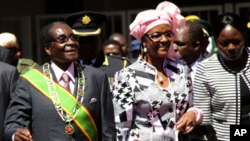MUTARE —
Representatives of so-called independent commissions set up under some provisions of Zimbabwe’s new constitution say the organizations are being neglected by the government as they are poorly funded while being used as political tools by the ruling Zanu-PF and other parties.
They say though some commissioners were appointed before the adoption of a new constitution this year, they have done nothing to curb corruption, address human rights issues and promote democracy.
Representatives of the Zimbabwe Human Rights Commission and the Zimbabwe Anti-Corruption Commission have been singing the same chorus at a two-day workshop, noting that their organizations are not visible in most communities as they appear to be appendages of the state.
Speaking at the two-day workshop in Mutare organised by the Zimbabwe Human Rights NGO Forum and the Zimbabwe Human Rights Organisation (ZimRights), the representatives of the two commissions voiced concern over the operation of the state-funded entities saying they are almost non-existent.
Sandra Nhau, a commissioner with the Zimbabwe Anti-Corruption Commission bemourned their docility, indicating that at times they cannot act accordingly as they do not want to “bite the hand that feeds us”.
She cited an example of how commissioners were caught up in a political storm when they attempted to investigate allegations of corruption in one of the government ministries.
Nhau said, “One of the core values of our commission is national interest. So, whenever we carry out our duties, we need to observe that core value. And if I am to be very honest with you today, when we tried to carry out searches in the offices of the then ministers of transport and indigenization, no of our officers who tried to effect those warrants of arrest were arrested.
“According to my own assessment, it was about wrong timing. Remember there is one party which actually was campaigning on the aspect of empowerment and that was the main issue on which their (election) manifesto was based on. So, by attacking the aspect of economic empowerment, I think that is where we erred as a commission. And remember as the Zimbabwe Anti-Corruption Commission we need to be very candid on this one.”
Nhau further noted that, “We are not totally independent as long as we get something from the state through the national budget. And by virtue of that fact, you cannot bite the hand that feeds you. If you try to do that, you will be in trouble. So, we need to be very much aware of that whenever we carry out our duties.”
Commissioner Kwanele Muriel Jirira agreed, saying the Zimbabwe Human Rights Commission and several others do not even have a secretariat.
“We are not visible and for that, you (NGOs) need to empower us. We need to be operational and that is why we need a secretariat. We need resources so that we can do our job. At the moment we feel that we are being gagged because it’s now five years into the term and we have done nothing. We also need to have a national plan since we have built a good rapport with NGOs. And we will always alert you whenever we feel that there is something amiss which needs to be investigated.”
Representatives of non-governmental organizations weighed in and expressed dismay over the manner in which the commissions are being run.
Zimbabwe Human Rights NGO Forum director, Abel Chikomo, said what is worrying is that there is no political will to ensure that the so-called independent commissions are allowed to operate as per some provisions of Zimbabwe’s supreme law.
“It will be important if these commissions are operational. We have seen, obviously as far as human right issues are concerned, our courts making some important decisions and in the end we have not seen really the commitment from the authorities in respecting and implementing those decisions,” said Chikomo.
A human rights activist, Simba Chihota, echoed Chikomo’s sentiments saying the government should allow these commissions to operate without any state interference.
Speaking on behalf of the government, Deputy Justice Minister Fortune Chasi, said government is committed in ensuring that the independent commissions are free from any form of political interference.
Mr. Chasi, who is also the Member of Parliament for Mazowe South, said the Human Rights Commission, Anti-Corruption Commission, Gender Commission and several others are being crippled by lack of funds instead of political interference.
According to the new constitution, the independent commissions are supposed to support and entrench human rights and democracy; protect the sovereignty and interests of the people; promote constitutionalism; promote transparency and accountability in public institutions, among many other issues.
They are supposed to be independent and not subject to the direction or control of anyone and exercise their functions without fear, favour and prejudice. Section 236 of the constitution stipulates that members of independent commissions must be non-political.
They say though some commissioners were appointed before the adoption of a new constitution this year, they have done nothing to curb corruption, address human rights issues and promote democracy.
Representatives of the Zimbabwe Human Rights Commission and the Zimbabwe Anti-Corruption Commission have been singing the same chorus at a two-day workshop, noting that their organizations are not visible in most communities as they appear to be appendages of the state.
Speaking at the two-day workshop in Mutare organised by the Zimbabwe Human Rights NGO Forum and the Zimbabwe Human Rights Organisation (ZimRights), the representatives of the two commissions voiced concern over the operation of the state-funded entities saying they are almost non-existent.
Sandra Nhau, a commissioner with the Zimbabwe Anti-Corruption Commission bemourned their docility, indicating that at times they cannot act accordingly as they do not want to “bite the hand that feeds us”.
She cited an example of how commissioners were caught up in a political storm when they attempted to investigate allegations of corruption in one of the government ministries.
Nhau said, “One of the core values of our commission is national interest. So, whenever we carry out our duties, we need to observe that core value. And if I am to be very honest with you today, when we tried to carry out searches in the offices of the then ministers of transport and indigenization, no of our officers who tried to effect those warrants of arrest were arrested.
“According to my own assessment, it was about wrong timing. Remember there is one party which actually was campaigning on the aspect of empowerment and that was the main issue on which their (election) manifesto was based on. So, by attacking the aspect of economic empowerment, I think that is where we erred as a commission. And remember as the Zimbabwe Anti-Corruption Commission we need to be very candid on this one.”
Nhau further noted that, “We are not totally independent as long as we get something from the state through the national budget. And by virtue of that fact, you cannot bite the hand that feeds you. If you try to do that, you will be in trouble. So, we need to be very much aware of that whenever we carry out our duties.”
Commissioner Kwanele Muriel Jirira agreed, saying the Zimbabwe Human Rights Commission and several others do not even have a secretariat.
“We are not visible and for that, you (NGOs) need to empower us. We need to be operational and that is why we need a secretariat. We need resources so that we can do our job. At the moment we feel that we are being gagged because it’s now five years into the term and we have done nothing. We also need to have a national plan since we have built a good rapport with NGOs. And we will always alert you whenever we feel that there is something amiss which needs to be investigated.”
Representatives of non-governmental organizations weighed in and expressed dismay over the manner in which the commissions are being run.
Zimbabwe Human Rights NGO Forum director, Abel Chikomo, said what is worrying is that there is no political will to ensure that the so-called independent commissions are allowed to operate as per some provisions of Zimbabwe’s supreme law.
“It will be important if these commissions are operational. We have seen, obviously as far as human right issues are concerned, our courts making some important decisions and in the end we have not seen really the commitment from the authorities in respecting and implementing those decisions,” said Chikomo.
A human rights activist, Simba Chihota, echoed Chikomo’s sentiments saying the government should allow these commissions to operate without any state interference.
Speaking on behalf of the government, Deputy Justice Minister Fortune Chasi, said government is committed in ensuring that the independent commissions are free from any form of political interference.
Mr. Chasi, who is also the Member of Parliament for Mazowe South, said the Human Rights Commission, Anti-Corruption Commission, Gender Commission and several others are being crippled by lack of funds instead of political interference.
According to the new constitution, the independent commissions are supposed to support and entrench human rights and democracy; protect the sovereignty and interests of the people; promote constitutionalism; promote transparency and accountability in public institutions, among many other issues.
They are supposed to be independent and not subject to the direction or control of anyone and exercise their functions without fear, favour and prejudice. Section 236 of the constitution stipulates that members of independent commissions must be non-political.





